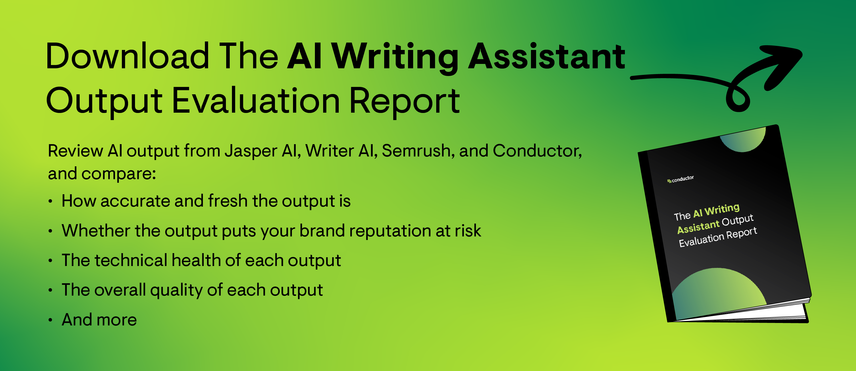The AI Writing Assistant Output Evaluation Report
The best AI writing assistants save you time, resources, and money. But if your AI writing assistant leaves you with generic content, incorrect information, security concerns, and out-of-date insights, it’s fair to wonder whether AI is helping or hurting your content productivity.
That’s why choosing the right AI writing assistant is so important. We compared and graded outputs from the top AI writing assistants on the market to see which brands help you create the strongest AI content, and which wind up creating more work than they save. But check out the outputs for yourself to make your own evaluation.
If you don’t leverage generative AI to optimize your workflows, you are destined to get left behind. You’ve probably heard that a lot over the last few years. And it’s true; companies can’t expect to stay ahead of the competitionCompetition
Businesses generally know who their competitors are on the open market. But are they the same companies you need to fight to get the best placement for your website? Not necessarily!
Learn more without being fully AI-enabled.
After all, AI writing assistants can help you increase your team’s efficiency and productivity as well as increase the likelihood that you appear on AI search engines.
In order to really make a mark with AI writing assistants, you need to make sure you choose the right technology, not just any technology.
But with so many options on the market, how do you choose the best AI writing assistant that actually drives results and boosts productivity? Dive into our AI Writing Assistant Output Evaluation Report to review outputs from some of the top AI writing tools for yourself and see how they stack up.
AI writing assistant evaluation methodology
In this report, we compare the content generated by four of the top AI writing assistants on the market: Jasper AI , Semrush , Writer AI , and our own Conductor Writing Assistant. Obviously, with this being a Conductor article, and us evaluating our own technology, there’s an inherent Conductor bias here that we’d like to acknowledge. That said, we’re confident that the output and accompanying screenshots make it clear that these results really speak for themselves.
The quality of a particular AI writing assistant is about much more than just how the words sound after the AI generates them. AI can create content that looks right on the surface, but if it’s full of inaccurate information and grammatical errors, then it’s ultimately creating a lot more work to optimize the output.
Now, a bit about our methodology for this evaluation, which comes down to the criteria we will use to evaluate the content outputs from each writing assistant and the topic query we use as the prompt. For criteria, we leveraged the framework we established in our Strategic Buyer’s Guide to AI Writing Assistants. The criteria include aspects of data collection, output expertise, the platform’s technical health and security considerations, and overall writing quality.
For the topic, we used the same target topic and keywords across each AI tool. For this May 2025 report–the first installment–of an ongoing series, the topic we chose was: NBA Playoffs 2025 Recap. We then judged each output based on the following rubric. AI technology will undoubtedly continue to evolve fast, and we plan to keep these evaluations coming to see how AI writing assistants hold up in this changing market. Stay tuned for future iterations of this report for the latest insights.
AI writing assistant evaluation rubric
Below is a breakdown of the evaluation criteria we used to grade each AI output, as well as the questions we asked ourselves as we graded the content. Check out the full report to see a breakdown of each AI output and compare them for yourself.
- Data: This category evaluates each AI output based on the quality of the model’s training data.
- Output specificity: Does the output include generic and basic, accurate information broadly available on Google and social media?
- Data freshness: How recent is the data being used to generate my content?
- Expertise: This category evaluates each AI output based on whether the model is generating sophisticated content or generic output.
- Domain expertise: Does the AI output leverage specific expertise in creating high-quality website content that performs well in organic search?
- Content score: Does the AI evaluate the quality of its output on its own?
- Technical health: This category evaluates each AI output based on whether it meets SEO requirements.
- Security: This category evaluates each AI output based on the safeguards that prevent data leakage, hallucinations, plagiarism, and other risks that could damage your brand reputation
- Hallucinations: Does the output include incorrect or fabricated information or statistics?
- Plagiarism: Does the output contain basic or generic language that could have been pulled word-for-word from existing sources?

Evaluating AI writing assistants in review
The landscape of AI writing tools is evolving rapidly, with new solutions emerging and existing ones constantly improving. This evaluation demonstrates that not all AI writing assistants are created equal—significant differences exist in output quality, data security, workflow integration, and overall business value.
As you evaluate options for your organization, remember that the best AI writing assistant shouldn't just generate more content faster—it should enhance your team's strategic capabilities, protect your proprietary information, increase visibility in traditional and AI search, and deliver measurable results that justify the investment.
Whether you prioritize domain expertise, security protocols, or measurement capabilities, our comprehensive evaluation report provides a detailed look at which AI writing assistant will position your content strategy for sustainable success in the new AI era based on current product capabilities.








